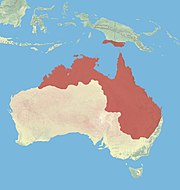Aprosmictus
Appearance
| Aprosmictus | |
|---|---|

| |
| Red-winged parrot (Aprosmictus erythropterus) | |
| Scientific classification | |
| Domain: | Eukaryota |
| Kingdom: | Animalia |
| Phylum: | Chordata |
| Class: | Aves |
| Order: | Psittaciformes |
| Family: | Psittaculidae |
| Tribe: | Polytelini |
| Genus: | Aprosmictus Gould, 1842 |
| Type species | |
| Psittacus erythropterus (red-winged parrot) Gmelin, 1788
| |
| Species | |
|
2, see text | |
Aprosmictus is a genus of parrots in the family Psittaculidae native to Oceania.[1] Several former members, including the Australian king parrot, are now placed in the genus Alisterus.
Taxonomy
[edit]The genus Aprosmictus was introduced in 1842 by the English ornithologist John Gould.[2][3] The type species was designated as the red-winged parrot by George Gray in 1846.[4] The name is from the Ancient Greek απροσμικτος/aprosmiktos which means "unsociable" or "solitary".[5]
The genus contains two species:[1]
| Common name | Scientific name and subspecies | Range | Size and ecology | IUCN status and estimated population |
|---|---|---|---|---|
| Jonquil parrot | Aprosmictus jonquillaceus (Vieillot, 1818) Two subspecies
|
Indonesian islands of Roti, Timor, and Weta | Size: Habitat: Diet: |
NT
|
| Red-winged parrot | Aprosmictus erythropterus (Gmelin, 1788) Two subspecies
|
Southern Australia ( Pilbara, Western Australia to Cape York Peninsula, Queensland)
|
Size: Habitat: Diet: |
LC
|
References
[edit]- ^ a b Gill, Frank; Donsker, David; Rasmussen, Pamela, eds. (January 2022). "Parrots, cockatoos". IOC World Bird List Version 12.1. International Ornithologists' Union. Retrieved 21 March 2022.
- ^ Gould, John (1842). The Birds of Australia. Vol. 1. London: self. p. lxv.
- ^ Dickinson, E.C.; Remsen, J.V. Jr., eds. (2013). The Howard & Moore Complete Checklist of the Birds of the World. Vol. 1: Non-passerines (4th ed.). Eastbourne, UK: Aves Press. p. 371. ISBN 978-0-9568611-0-8.
- ^ Gray, George Robert (1845). The Genera of Birds : comprising their generic characters, a notice of the habits of each genus, and an extensive list of species referred to their several genera. Vol. 2. London: Longman, Brown, Green, and Longmans. Pages not numbered, after Plate 100, Note 23.
- ^ Jobling, James A. (2010). The Helm Dictionary of Scientific Bird Names. London: Christopher Helm. p. 51. ISBN 978-1-4081-2501-4.


